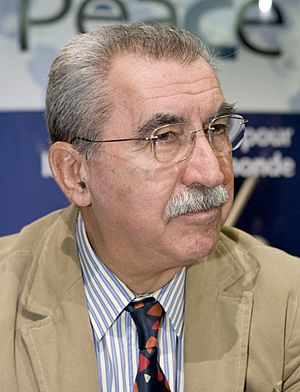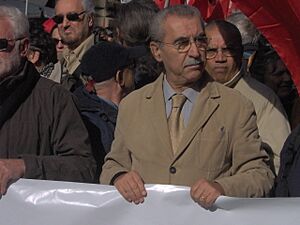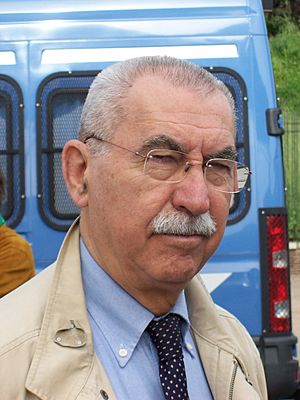Giulietto Chiesa facts for kids
Quick facts for kids
Giulietto Chiesa
|
|
|---|---|

Giulietto Chiesa, 2005
|
|
| Member of the European Parliament | |
| In office 20 July 2004 – 13 July 2009 |
|
| Constituency | North-West Italy |
| Personal details | |
| Born | 4 September 1940 Acqui Terme, Province of Alessandria, Italy |
| Died | 26 April 2020 (aged 79) |
| Political party | PCI (1967–1991) IdV (2003–2006) |
| Height | 1.72 m (5 ft 8 in) |
| Spouse | Fiammetta Cucurnia |
| Children | 1 |
| Profession | Journalist, politician |
Giulietto Chiesa (born September 4, 1940 – died April 26, 2020) was an Italian journalist, writer, and politician. He was a Member of the European Parliament and worked on important committees there. He was also known for starting a cultural group called Megachip and for being the main editor of Pandora TV, an online TV channel.
Contents
Early Life and Education
Giulietto Chiesa was born in Acqui Terme, Italy, on September 4, 1940. He started studying physics at the University of Genoa but did not finish his degree. Later, in 1989–1990, he was a special researcher at the Kennan Institute in Washington, which focuses on Russian studies.
Career Highlights
Political Beginnings
Chiesa was involved in politics from a young age. He started as a student leader in Genoa. He later became a national leader for a youth group connected to the Italian Communist Party. From 1970 to 1979, he led the Communist Party's branch in Genoa. He also served on the county council of Genoa. In 1979, he left his political party role to become a journalist.
Journalism and Writing
Chiesa began his journalism career in 1979. He first worked as an editor for the Italian newspaper L'Unità. From 1980, he became their correspondent in Moscow, Russia. He also gave talks at many universities and research places in the United States.
In 1991, he became the Moscow correspondent for another Italian newspaper, La Stampa. He stayed in Russia until 2000. During this time, he also worked with Radio Liberty. He continued writing for La Stampa until 2005. He also wrote for other Italian newspapers and magazines.
Chiesa worked with many TV and radio stations. These included Italian, European, American, and Russian channels like BBC World Service and Channel One Russia. He often appeared on Italian TV shows to share his political opinions.
He wrote several books about the Soviet Union and Russia. His first book, Operazione Teheran (1980), was about a failed rescue mission in Tehran. He also wrote books with Roy Medvedev, a Russian political thinker, about changes in the Soviet Union. Other books included Cronaca del Golpe Rosso (1991) and Russia Addio (1997).
Megachip and "Zero" Movie
In 1999–2000, Chiesa started Megachip – Democracy in Communications. This group looked closely at how mainstream media works. They also created a website to share their findings. From Megachip, other projects grew, like a program to teach about media and a movie called Zero: An Investigation into 9/11.
The movie Zero: An Investigation into 9/11 was presented in 2007. It explored different ideas and questions about the events of September 11, 2001. The movie was shown on Russian Channel 1 television in 2008 and was watched by many people. However, a book called "Zerobubbole" later challenged many of the movie's claims.
Chiesa also wrote books about globalization and how it affects the media. He was involved in starting the World Political Forum with Mikhail Gorbachev.
After returning from Moscow, he wrote more books. His book G8/Genova (2001) was about the G8 summit in Genoa. He also co-wrote Afghanistan Year Zero (2001), which sold many copies. Another popular book was La Guerra Infinita (2002), which was translated into several languages.
In 2004, Giulietto Chiesa was elected to the European Parliament. He was part of the Italy of Values political group. Later, he joined another group as an independent member.
Views on Conflicts
Chiesa shared his thoughts on the Russo-Georgian War in 2008. He believed that Russia's actions were necessary. He also thought that Europe was partly to blame for the conflict. He criticized how Western media covered the war, saying it was biased.
Pandora TV and Later Works
In late 2008, Chiesa and other journalists started Pandora TV. This was an online TV channel funded by its viewers.
In 2010, he wrote La Menzogna Nucleare (The Nuclear Lie) about nuclear energy. He also wrote Il Candidato Lettone (The Latvian Candidate), about his election campaign in Latvia. In 2010, he founded a cultural and political group called Alternativa in Genoa.
In 2011, he released Zero 2. The Smoking Guns, which continued to explore questions about 9/11. He also co-wrote Barack Obush.
His book Instead of Catastrophe (2012) shared his main ideas about global challenges. In later years, Chiesa became very active on social media. His posts often received hundreds of thousands of views.
In 2015, he published È arrivata la bufera (The Storm has come). This book discussed events like the Charlie Hebdo shooting. In 2016, he released Russofobie 2.0, which explored negative views towards Russia.
Video Documentary
- ZERO - An Investigation into 9/11. Directed by Franco Fracassi and Francesco Trento, on YouTube (full documentary), 104'.
See also
 In Spanish: Giulietto Chiesa para niños
In Spanish: Giulietto Chiesa para niños



